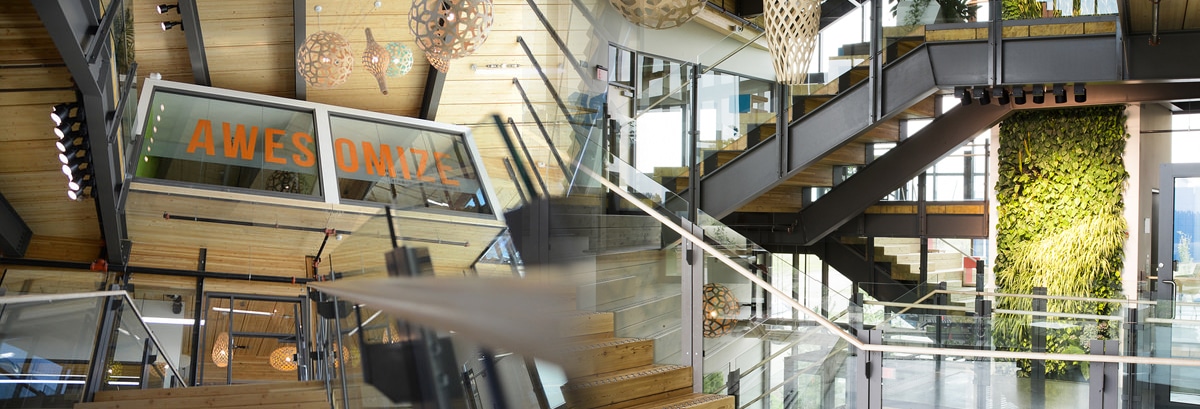priMED Mosaic Centre
Edmonton, Alberta
October 2, 2017
- Rating System/Standard
- LEED v1
- Certification Level
- Platinum
- Building Type
- Mixed-use
Located in the south end of Edmonton, the priMED Mosaic Centre is a net zero and LEED Platinum certified commercial building. The three-storey, 30,000 sq.ft. mixed-use building includes office space for 110 people, a childcare facility, restaurant, wellness centre, games room and a large common atrium area with bleacher-style seating. Designed to demonstrate the feasibility of low-energy buildings in cold climates, the building utilized wood construction to meet all building science challenges and provide an enhanced interior work environment.
The building received a LEED Platinum for New Construction certification in October 2017. We spoke with Craig Blackburn, Senior Brand Manager for the centre’s owner, priMED Medical Products Inc., about why it was important to pursue this certification despite challenges brought on by an economic downturn throughout the province.
Project Team
- Project Owner
- Dennis Cuku and Christy Benoit
- Architect
- Manasc Isaac
- LEED Consultant
- EcoAmmo
- Mechanical Engineer
- Clark Engineering
- Electrical Engineer
- Manasc Isaac
- Structural Engineer
- Fast & Epp
- Landscape Architect
- PICEA
- Contractor/Builder
- Chandos Construction
- Commissioning Authority
- Integrated Designs
Other
- Energy Modelling & Geothermal Design
- Revolve Engineering
- Civil
- DGE
- Solar
- Great Canadian Solar
- Electrical Trade Partner
- River City Electric
- Envelope Trade Partner
- Metala-Con Construction
- Mechanical Trade Partner
- Priority Mechanical
- Structural Steel Trade Partner
- Collins Steel
- Structural Trade Partner
- Western Archrib
- Drywall Trade Partner
- Baytekv
- Glazing Supplier
- GlasCurtain
- Glazing Trade Partner
- Ferguson
- Roofing Trade Partner
- Standard Roofing
- Interior Design
- Blue Graphite
- Kitchen Concrete & Glass Countertops
- Urban Concrete
- Kitchen Tables & Benches
- Liken Woodworks
- Phone Booths
- ONETWOSIX Design
- Reception Desk
- Habitat Studio
- Restroom Wood Counters
- Oliver Apt.
- Tables & Seating
- Jeff Johnston Design
- Wayfinding Signage & Artwork
- Clay Lowe Design
Diversifying building sustainability in Alberta
The building’s original owners, Christy Benoit and Dennis Cuku of Oil Country Engineering Services Ltd., envisioned the project as a demonstration of how oil and gas profits could be diversified into the sustainability sector.
“They wanted to lead by example and build Alberta’s first attempt at a net zero energy commercial building,” says Blackburn.
The pair already had an existing relationship with the project’s LEED consultant EcoAmmo, which had helped them build a net zero energy home. EcoAmmo also worked with them to make the OCE office greener, leading to a first-place win in the City of Edmonton’s Small Business Eco Challenge. As such, sustainability was a clear priority for Benoit and Cuku when it came time to build a new office for their business that would provide enough space for future growth.
Powered by an array of photovoltaic panels with a capacity of more than 213 kW and heated/cooled by 32 geothermal wells, the priMED Mosaic Centre project also includes the following key features:
- 95 per cent of materials diverted from landfill during construction
- Four electric car-charging stations
- 30 per cent edible landscape
- On-site composting
- 26,500-litre rainwater retention tank
- Three-storey “living wall” (vertical garden) in foyer
Construction began in March 2014 and was completed in the fall of 2015, three months ahead of schedule and on budget. In August 2017, priMED purchased the building from OCE, with plans to move into the centre in the summer of 2018.
“Operating costs, corporate legacy, employee satisfaction and productivity, health improvements and corporate social responsibility were all factors that weighed heavily into our decision to purchase the building,” Blackburn adds.
Leveraging LEED to attract quality tenants
The original owners’ space requirements led them to the idea of a building they could use themselves but that would also have areas they could lease out to the community. Their hope was to attract tenants who would value sustainability as much as they do, and they knew that successfully obtaining a third-party certification such as LEED would help them appeal to the right people.
Two rating systems were originally selected for this project: the Living Building Challenge (LBC) standard and LEED. While LBC was the driver for all design decisions, the owners wanted the more recognizable LEED certification to add value to its tenant offering.
Making green practices a priority through economic challenges
The process of obtaining certification came with some ups and downs, largely due to the economic downturn in Alberta. The original owners needed to float the mortgage on the building while they sought out tenants who would meet the stringent requirements of the LBC Petal program. After 11 months, they took tenants who were a great fit, but not a perfect fit – and thus had to let the LBC certification drop. As well, much of the operational monitoring for the building also had to be left aside, resulting in data collection challenges. At one point, it also looked like the building might be certified as LEED Gold instead of attaining its desired LEED Platinum certification, but the project team was able to work through its complexities to achieve this goal.

Designing with waste reduction in mind
The project targeted several performance goals in its pursuit of both the LBC Petal and LEED certifications, including net zero energy and waste diversion of at least 75 per cent during construction, the latter of which it exceeded with 95 per cent of all materials diverted from landfill. As part of this goal, the project’s design team was given the task of creating furniture and artwork using wood scraps from the building’s structure. This was so successful that they actually ran out of scrap material and had to purchase waste from others to complete the commissioned pieces.
Utilizing local resources was also a key focus and as such all project team members were from Alberta, with 99 per cent of them being from Edmonton. As well, the project achieved an innovation point with more than 40 per cent in regional materials. The team also prioritized interior health quality, obtaining 13 out of 15 points in the Indoor Environmental Quality category of the LEED rating system, including credits for increased ventilation and use of low-emitting materials.
And even more office improvements are in the works as current building owner priMED plans its Summer 2018 move to the centre. “We are currently in the planning stages of documenting and monitoring our operations so we can better understand our tenant and staff productivity, health impacts, as well as operational performance data, including retention, occupancy rates and rental cost comparisons,” says Blackburn.

LEED SCORE CARD
| Certification Level | Platinum |
| Rating System | LEED Canada for New Construction and Major Renovations |
| Total Points earned | 82 |
| Sustainable Sites | 16 out of 26 |
| Water Efficiency | 7 out of 10 |
| Energy & Atmosphere | 31 out of 35 |
| Materials & Resources | 5 out of 14 |
| Indoor Environmental Quality | 13 out of 15 |
| Innovation | 6 out of 6 |
| Regional Priority Credits | 4 out of 4 |
